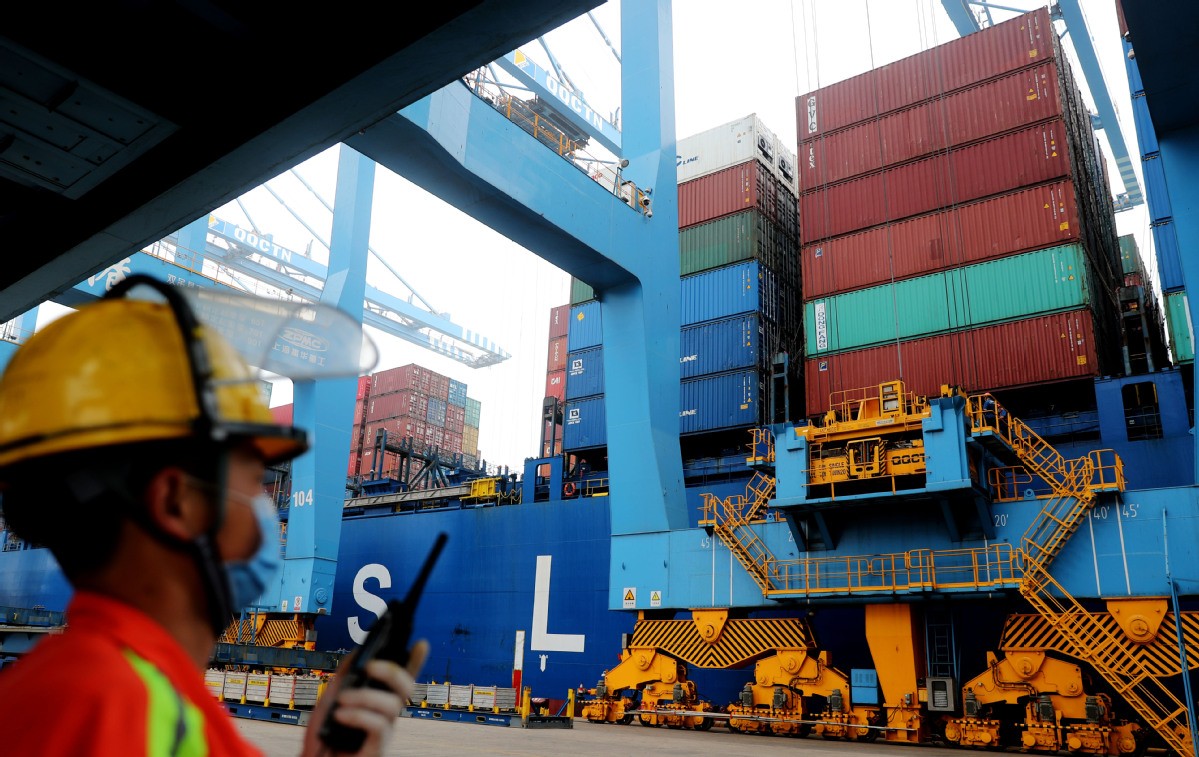BRICS countries urge enhanced cooperation-[supply chain diversity; higher-end value chains; trade cooperation]
2022.06.24 SOURCE: CHINA DAILY

An employee loads cargo bound for South Africa at Qingdao Port, Shandong province. [Photo by ZHANG JINGANG/FOR CHINA DAILY]
China's trade with other 4 in the group soars 39.2 percent to $490b in 2021
The enhanced cooperation among BRICS countries will consolidate supply chain resilience and diversification, creating favorable growth conditions for trade, investment as well as green and digital industries at a time of global instability, said government officials and business leaders.
The BRICS mechanism, featuring five major emerging economies-namely Brazil, Russia, India, China and South Africa-has blazed a glorious trail over the past 16 years since its inception in 2006, and has become a positive, stable and constructive force in international affairs.
Calling BRICS countries stabilizers and integrators of the global supply chain, representatives of BRICS business communities jointly released the Beijing Initiative of BRICS Business Community to promote comprehensive, close, practical and inclusive cooperation, it was announced during the BRICS Business Forum, held in Beijing late Wednesday.
Amid labor shortages and logistical constraints caused by the COVID-19 pandemic that have severely disrupted regional and global supply chains, and given rising protectionism is also challenging economic globalization, they said BRICS countries have helped maintain open, resilient, transparent, trustworthy and stable global and regional industrial and supply chains. This helped to upgrade their industries to higher-end value chains and thus better respond to the COVID-19 pandemic and realize economic recovery.
In addition to encouraging governments of BRICS countries to take into account the challenges faced by small and medium-sized enterprises amid the COVID-disrupted recovery, the initiative document urged BRICS economies to facilitate the operation of supply chains among the five countries via timely implementation of the World Trade Organization's Trade Facilitation Agreement.
"For the BRICS countries, it is critical for emerging and developing nations to strengthen trade cooperation among themselves," said Wang Shouwen, vice-minister of commerce, adding that it will be practical to establish free trade agreements to further boost trade volume and China is ready to discuss this with other BRICS countries.
China's foreign trade with other BRICS countries soared 39.2 percent year-on-year to $490.42 billion in 2021, said the General Administration of Customs.
In his keynote speech at the BRICS Business Forum, delivered via video link, President Xi Jinping expressed the hope that business leaders will continue to act with tenacity and in a pioneering spirit, tap into the complementarity of BRICS countries' diverse economic structures and resources, upgrade cooperation on trade, investment and finance, expand cooperation on cross-border e-commerce, logistics, local currencies and credit rating, and keep industrial and supply chains safe and unclogged.
BRICS countries, as a next step, should vigorously advocate digital-driven and smart development to transform and upgrade traditional industries, and expand trade and investment cooperation in developing renewable energy to further improve their industrial structures, said Wang Lei, director of the research center for BRICS cooperation at Beijing Normal University.
BRICS countries are the new engines of global economic recovery and growth. They have collectively contributed as much as 50 percent to global growth, which is "much higher than that of the developed economies such as the G7", said a report released by the Chongyang Institute for Financial Studies at Beijing-based Renmin University of China earlier this week.
Guo Qing, managing director and vice-president of commercial aviation for China of Brazilian aircraft maker Embraer-which has over 100 aircraft operating in China-said the country's high-quality development will foster continued growth in the aviation industry in the post-pandemic era.
"We will continue to be a bridge between China and Brazil, and seek more opportunities to cooperate with local partners to expand our industry presence," Guo said, adding that the company will work with its customers to provide customized aircraft to meet demand from China's remote regions.
Also on Thursday, Shu Jueting, spokeswoman of the Ministry of Commerce, said at a news conference that China will continue to expand high-level opening-up and proactively respond to demand from foreign enterprises in China to ensure a facilitating environment.
The ministry has recently released policy measures for ensuring services for key foreign-funded projects and attracting investment from abroad, which require local authorities to focus on key foreign-funded projects and provide full-process services to boost the growth of foreign-funded enterprises.


